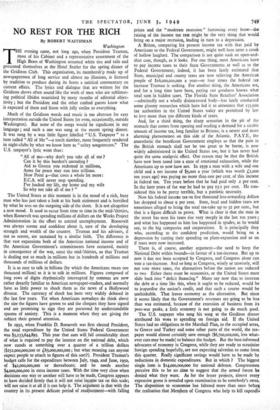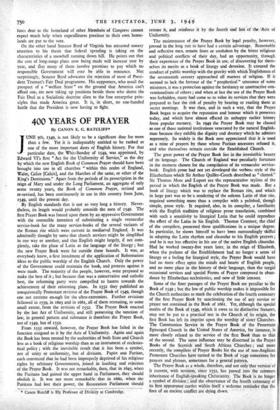NO REST FOR THE RICH
By ROBERT WAITHMAN
THE evening came, not long ago, when President Truman, most of his Cabinet and a representative assortment of the High Brass of Washington assumed white ties and tails and presented themselves at the Hotel Statler for the spring dinner of the Gridiron Club. This organisation, its membersh:p made up of newspapermen of long service and almost no illusions, is licensed by tradition to produce during its feasts a satirical commentary on current affairs. The lyrics and dialogue that are written for the Gridiron shows often sound like the work of men who are sublimat- ing political libidos nourished by many months of editorial objec- tivity; but the President and the other exalted guests know what is expected of them and listen with jolly smiles to everything.
Much of the Gridiron words and music is too abstruse for easy interpretation outside the United States (or even, occasionally, outside Washington). But some of the songs would be significant in any language ; and such a one was sung at the recent spring dinner. It was sung by a wan little figure. labelled "U.S. Taxpayer" to a tune called "All of Me "—a torch number, more frequently rendered in night-clubs by what we know here as "sultry songstresses." The U.S. taxpayer's lyric went thus:
"All of me—why don't you take all of me ?
Can it be this burden's unending ?
Aid to Greece you reckoned in millions, Arms for peace may run into trillions. Now Point 4—that costs a whole lot more: E.C.A. will never stop spending.
I've hocked my life, my home and my wife So why not take all of me ? "
The United States at this moment is in the mood of a rich, busy man who has just taken a look at his bank statement and is horrified by what he sees on the outgoing side of the sheet. It is not altogether a new mood. It used to occur from time to time in the mid-'thirties, when Roosevelt was spending millions of dollars on the Works Project Administration in the effort to control unemployment. Roosevelt was always serene and confident about it, sure of the developing strength and wealth of the country. Truman and his advisers, if not so serene, are sustained by a similar faith. The difference is that vast expansions both of the American national income and of the American Government's commitments have occurred, mainly in consequence of the war, since the mid-'thirties, so that Truman is dealing not so much in millions but in hundreds of millions and thousands of millions of dollars.
It is as easy to talk in billions (by which the Americans mean one thousand million) as it is to talk in millions. Figures composed of long rows of digits rhythmically interrupted by commas are now rather drearily familiar to American newspaper-readers, and normally have as little power to shock them as the news of a Hollywood divorce. The currency of shock has been very widely debased in the last few years. Yet when Americans nowadays do think about the size the figures have grown to and the cheques they have signed and are promising to sign they are possessed by understandable spasms of anxiety. This is a moment when they are giving the subject their general attention.
In 1932, when Franklin D. Roosevelt was first elected President, the total expenditure by the United States Federal Government was $5,553,644,895. This year that sum will fall considerably short of what is required to pay the interest on the national debt, which now stands at something over a quarter of a trillion dollars ($252,000,000,000 or £63,000,000,000 ; but what meaning can anyone expect people to attach to figures of this sort?). President Truman's budget calls for the expenditure between July, 1949, and June, 1950, of $42,00o,000,000 or thereabouts; and he needs another $4,000,000,000 in extra income taxes. With the time very close when decisions one way or another will have to be made, Congress appears to have decided firmly that it will not raise income tax on this scale; will not raise it at all if it can help it. The argument is that with the country in its present delicate period of readjustment—with falling prices and the "moderate recession" furrowing every brow—the raising of the income tax rate might be the very thing that would bring on a major recession, leading in turn to a depression.
A Briton, comparing his present income tax with that paid by Americans to the Federal Government, might well here utter a croak of hollow laughter. The comparison is not quite such an open-and- shut case, though, as it looks. For one thing, most Americans have to pay income taxes to their State Governments as well as to the Federal Government; indeed, it has been lately estimated that State, municipal and county taxes are now relieving the American people of $16,000,000,000 a year—or four times the federal tax increase Truman is seeking. For another thing, the Americans are, and for a long time have been, paying out goodness knows what total sum in hidden taxes. The Florida State Retailers' Association —admittedly not a wholly disinterested body—has lately conducted some gloomy researches which have led it to announce that 155,000 tax authorities in the United States today are permitted by law to levy more than soo different kinds of taxes.
And, for a third thing, the sharp sensation in the pit of the stomach that comes from opening and reading a demand for a sizable amount of income tax, long familiar to Britons, is a newer and more alarming phenomenon on this side of the Atlantic. P.A.Y.E., the anaesthetic the beneficent Government employs so that the pain in the British stomach shall not be too great to be borne, is now widely administered in the United States too, but it has never had quite the same analgesic effect. One reason may be that the British have now been taxed into a state of emotional exhaustion, while the Americans up to now have not In 5939 a man with a wife and one child and a net income of $5,000 a year (which was worth ki,000 ten years ago) was paying no more than one per cent, of this income in federal tax. Ten years before that he had paid only .5 per cent. In the later years of the war he had to pay 15.5 per cent. He con- sidered this to be pretty terrible, but a patriotic necessity.
Now his federal income tax on five thousand less-rewarding dollars has dropped to about 9 per cent. State, local and hidden taxes are sometimes alleged to bring the total tax-take up to 32 per cent., but that is a figure difficult to prove. What is clear is that the man in the street has seen his taxes rise very steeply in the last ten years ; and what has happened to him has happened in spades, as he would say, to the big companies and corporations. It is principally they who, according to the confident prediction, would bring on a depression by cutting their spending on plant-expansion and so on if taxes were now increased.
There is, of course, another argument—the need to keep the National Debt within bounds—in favour of a tax-increase. But up to now it has not been accepted by Congress, and Congress alone can vote a tax-increase. And so long as Congress, wisely or unwisely, will not vote more taxes, the alternatives before the nation are reduced to two Either there must be economies, or the United States must slide back into "deficit financing." Many say now that to increase the debt at a time like this, when it ought to be reduced, would be to jeopardise the nation's credit, and that such a course would be unthinkable. That leaves economy as the alternative. But since it seems likely that the Government's revenues are going to be less than was estimated, because of the recession of business from its post-war peaks, a little economy is not going to do much good.
The U.S. taxpayer who sang his song at the Gridiron dinner attributed his woes to spending on foreign aid. If the United States had no obligations to the Marshall Plan, to the occupied areas, to Greece and Turkey and some other parts of the world, the tax- payer would almost certainly save enough ($6,700,000,000, less what- ever cuts may be made) to balance the budget. But the best-informed advocates of economy in Congress, while they arc ready to scrutinise foreign spending hopefully, are not expecting salvation to come from this quarter. Really significant savings would have to be made by reductions in domestic expenditures. But in which ? The biggest single item is $lit,000,000,000 for national defence. Congressmen perceive this to be no time to suggest that the armed forces be denied what they want. As for the lesser projects, almost every expensive goose is revealed upon examination to be somebody's swan. The disposition to economise has faltered more than once befol the realisation that Members of Congress who help to kill expendt.
tures dear to the homeland of other Mernbers.of Congress cannot expect much help when expenditures precious to their own -home- lands are put to the vote.
On the other hand Senator Byrd of Virginia has attracted uneasy attention to his thesis that federal spending is taking on the characteristics of a snowball running down hill. He points out that the cost of long-range plans now being made will increase year by year, and that many of them involve promises to pay which no responsible Government will ever be able to renounce. Not surprisingly, Senator Byrd advocates the rejection of most of Presi- dent Truman's Fair Deal programme. His supporters, who assail the prospect of a "welfare State" on the ground that America can't afford one, are now taking up positions beside those who damn the Fair Deal as a Socialistic doctrine alien to the free enterprise prin- ciples that made America great. It is, in short, no one-handed battle that the President is now having to fight.



































 Previous page
Previous page